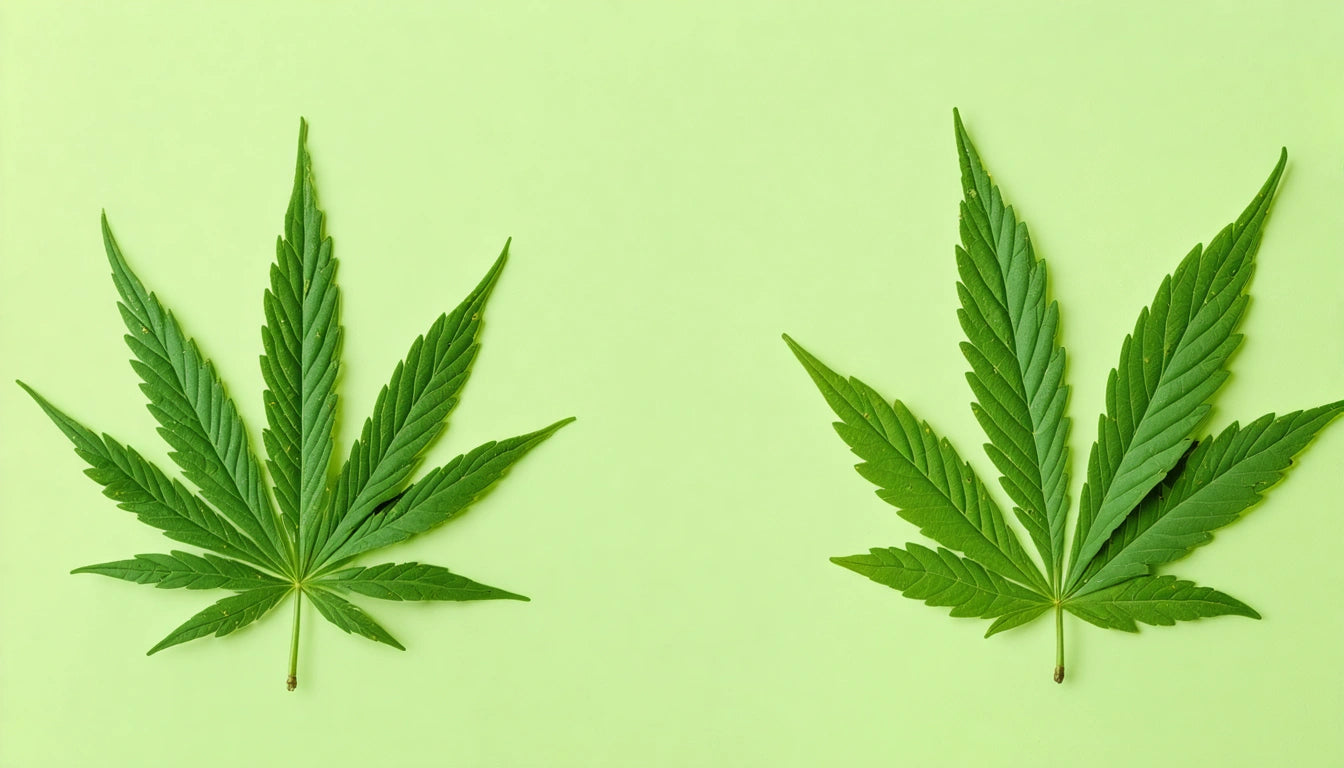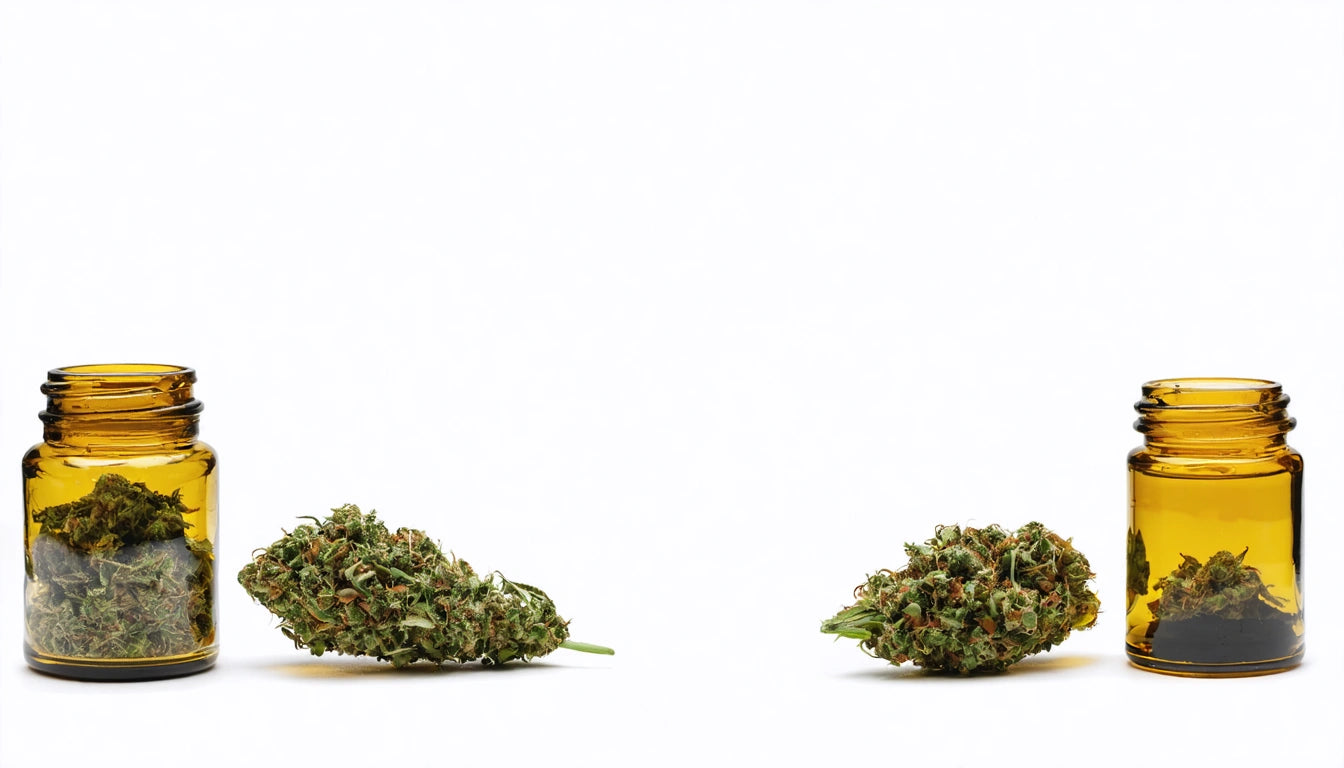Table of Contents
Understanding the Differences: CBC vs CBD for Anxiety and Wellness
As interest in cannabinoids grows, consumers and healthcare professionals alike are exploring beyond the well-known THC and CBD compounds. Cannabichromene (CBC) has emerged as another promising cannabinoid with unique properties and potential benefits. This guide examines the key differences between CBC vs CBD, particularly for anxiety management and overall wellness applications.
Understanding Cannabinoids: CBC and CBD Basics
Cannabinoids are compounds that interact with the body's endocannabinoid system (ECS), a complex cell-signaling network that helps maintain homeostasis. While CBD (cannabidiol) has become widely recognized for its non-intoxicating therapeutic potential, CBC (cannabichromene) remains less understood despite being one of the six most abundant cannabinoids in the cannabis plant.
CBD works primarily by interacting with CB1 and CB2 receptors, as well as other receptor types like serotonin receptors. Understanding CBD's interactions helps explain its wide range of potential benefits, from anxiety reduction to pain management.
CBC, by contrast, has minimal binding affinity for CB1 receptors but interacts with other receptors, particularly TRPV1 and TRPA1, which are involved in pain perception and inflammation response. This different mechanism of action contributes to CBC's unique effects compared to CBD.
Chemical Structures and Extraction Methods
Both CBC and CBD derive from the same precursor, cannabigerolic acid (CBGA), often called the "mother cannabinoid." As cannabis plants mature, enzymes convert CBGA into various cannabinoid acids, including CBDA (cannabidiolic acid) and CBCA (cannabichromenic acid). When exposed to heat, these acids decarboxylate into CBD and CBC respectively.
The chemical structure of these compounds differs slightly but significantly:
- CBD has a cyclohexene ring with a hydroxyl group
- CBC contains a chromene ring structure
- These structural differences account for their varying interactions with the body's receptors
Extraction methods for both compounds typically involve similar processes, though CBC is generally present in much smaller quantities in most cannabis strains, making it more challenging and expensive to isolate in significant amounts.
Therapeutic Effects and Research Findings
Research into CBC's potential benefits has revealed several promising applications, though studies remain preliminary compared to the more extensive research on CBD.
CBD has demonstrated effectiveness for:
- Anxiety and stress reduction
- Pain management
- Seizure control (FDA-approved for certain forms of epilepsy)
- Sleep improvement
- Inflammation reduction
CBC shows promise for:
- Anti-inflammatory effects, potentially more potent than CBD in some contexts
- Neuroprotective properties
- Potential antidepressant effects
- Pain relief through different pathways than CBD
- Possible acne reduction through sebum regulation
When comparing these cannabinoids to others like CBG (cannabigerol), research suggests each has a unique therapeutic profile. Comparing cannabinoids helps consumers understand which might best address their specific needs.
CBC vs CBD for Anxiety Management
CBD for Anxiety
CBD has substantial research supporting its anxiolytic (anxiety-reducing) properties. It appears to work through multiple mechanisms, including:
- Interaction with serotonin receptors (5-HT1A)
- Modulation of GABA levels, promoting relaxation
- Regulation of stress hormone production
Clinical studies have shown CBD may help with various anxiety disorders, including generalized anxiety, social anxiety, PTSD, and panic disorder. CBD's potential for anxiety and depression makes it a popular choice for those seeking natural alternatives to conventional medications.
CBC for Anxiety
Research on CBC specifically for anxiety is more limited, but preliminary findings suggest it may offer complementary benefits:
- CBC may enhance the production of anandamide, an endocannabinoid known as the "bliss molecule"
- Its interaction with TRPV1 receptors may indirectly influence anxiety responses
- Some studies suggest CBC may have antidepressant properties, which could benefit those with comorbid anxiety and depression
The entourage effect suggests that CBC and CBD may work better together than either alone for anxiety management, though more research is needed to confirm this synergy.
Product Availability and Consumption Methods
CBD products dominate the current market, available in numerous forms including oils, capsules, edibles, topicals, and smokable flower. CBC products are less common but growing in availability, particularly in combination with other cannabinoids.
For those interested in pre-rolled options that might contain various cannabinoid profiles, customizable pre-roll packaging solutions allow brands to clearly communicate cannabinoid content to consumers, an important consideration as interest in minor cannabinoids grows.
Popular consumption methods include:
- Sublingual oils and tinctures for both CBD and CBC
- Vape products for faster onset of effects
- Topicals for localized relief
- Edibles and capsules for longer-lasting effects
When choosing between CBD and CBC products, consumers should consider factors like onset time, duration of effects, and specific symptom targets. Understanding CBD dosage principles may also apply to CBC, though optimal dosages may differ.
Legal Considerations and Regulatory Status
The legal landscape differs significantly between these cannabinoids:
- CBD derived from hemp (containing less than 0.3% THC) is federally legal in the US following the 2018 Farm Bill
- CBD products have received some FDA recognition, with one CBD-based medication (Epidiolex) approved for certain seizure disorders
- CBC derived from hemp is generally considered legal under the same framework as CBD
- Neither cannabinoid is scheduled under the Controlled Substances Act if derived from compliant hemp sources
International regulations vary widely, with some countries permitting both cannabinoids and others restricting all cannabis derivatives regardless of THC content. Traveling with CBD or CBC products requires careful research into destination regulations.
Future Applications and Research Directions
The future of CBC and CBD research points toward several exciting developments. As studies progress, we may see more targeted applications based on each cannabinoid's unique properties. Combination therapies leveraging the entourage effect could provide enhanced benefits for specific conditions, particularly anxiety disorders that respond to multiple mechanisms of action.
Emerging research into what is CBC and CBG suggests these minor cannabinoids may eventually gain recognition comparable to CBD. As analytical techniques improve and consumer interest grows, product development will likely expand to include more precisely formulated combinations tailored to specific wellness goals.
For consumers navigating CBC vs CBD for anxiety and other concerns, staying informed about evolving research will be key to making appropriate choices for their individual needs. While CBD currently offers more robust evidence for anxiety management, CBC's unique properties make it a cannabinoid worth watching as research continues to unfold.











Leave a comment
All comments are moderated before being published.
This site is protected by hCaptcha and the hCaptcha Privacy Policy and Terms of Service apply.